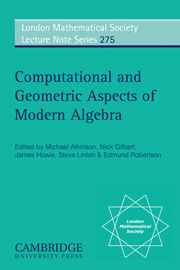Book contents
- Frontmatter
- Contents
- Foreword
- Participants
- 1 Lie Methods in Growth of Groups and Groups of Finite Width
- 2 Translation numbers of groups acting on quasiconvex spaces
- 3 On a term rewriting system controlled by sequences of integers
- 4 On certain finite generalized tetrahedron groups
- 5 Efficient computation in word-hyperbolic groups
- 6 Constructing hyperbolic manifolds
- 7 Computing in groups with exponent six
- 8 Rewriting as a special case of non-commutative Gröbner basis theory
- 9 Detecting 3-manifold presentations
- 10 In search of a word with special combinatorial properties
- 11 Cancellation diagrams with non-positive curvature
- 12 Some Applications of Prefix-Rewriting in Monoids, Groups, and Rings
- 13 Verallgemeinerte Biasinvarianten und ihre Berechnung
- 14 On groups which act freely and properly on finite dimensional homotopy spheres
- 15 On Confinal Dynamics of Rooted Tree Automorphisms
- 16 An asymptotic invariant of surface groups
- 17 A cutpoint tree for a continuum
- 18 Generalised triangle groups of type (2, m, 2)
8 - Rewriting as a special case of non-commutative Gröbner basis theory
Published online by Cambridge University Press: 06 July 2010
- Frontmatter
- Contents
- Foreword
- Participants
- 1 Lie Methods in Growth of Groups and Groups of Finite Width
- 2 Translation numbers of groups acting on quasiconvex spaces
- 3 On a term rewriting system controlled by sequences of integers
- 4 On certain finite generalized tetrahedron groups
- 5 Efficient computation in word-hyperbolic groups
- 6 Constructing hyperbolic manifolds
- 7 Computing in groups with exponent six
- 8 Rewriting as a special case of non-commutative Gröbner basis theory
- 9 Detecting 3-manifold presentations
- 10 In search of a word with special combinatorial properties
- 11 Cancellation diagrams with non-positive curvature
- 12 Some Applications of Prefix-Rewriting in Monoids, Groups, and Rings
- 13 Verallgemeinerte Biasinvarianten und ihre Berechnung
- 14 On groups which act freely and properly on finite dimensional homotopy spheres
- 15 On Confinal Dynamics of Rooted Tree Automorphisms
- 16 An asymptotic invariant of surface groups
- 17 A cutpoint tree for a continuum
- 18 Generalised triangle groups of type (2, m, 2)
Summary
INTRODUCTION
Rewriting for semigroups is a special case of Gröbner basis theory for noncommutative polynomial algebras. The fact is a kind of folklore but is not fully recognised. So our aim in this paper is to elucidate this relationship. A good introduction to string rewriting is, and a recent introduction to non-commutative Gröbner basis theory is. Similarities between the two critical pair completion methods (Knuth-Bendix and Buchberger's algorithm) have often been pointed out in the commutative case. The connection was first observed in and more closely analysed in and more recently in and. In particular it is well known that the commutative Buchberger algorithm may be applied to presentations of abelian groups to obtain complete rewrite systems.
Rewriting involves a presentation sgp〈X|R〉 of a semigroup S and presents S as a factor semigroup X† / =R where X† is the free semigroup on X and =R is the congruence generated by the subset R of X† × X†. Non-commutative Gröbner basis theory involves a presentation alg〈X|F〉 of a non-commutative algebra A over a field K and presents A as a factor algebra K[X†]/〈F〉 where K[X†] is the free K-algebra on the semigroup X† and 〈F〉 is the ideal generated by F, a subset of K[X†].
- Type
- Chapter
- Information
- Computational and Geometric Aspects of Modern Algebra , pp. 101 - 105Publisher: Cambridge University PressPrint publication year: 2000
- 2
- Cited by



